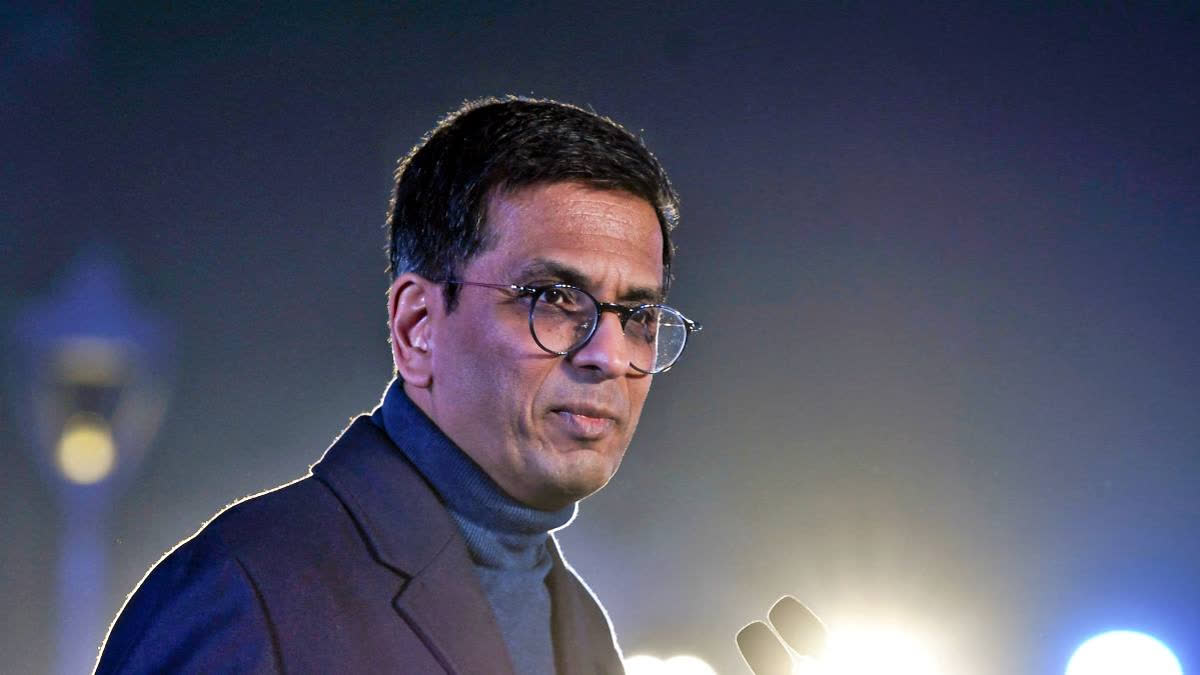New Delhi:DY Chandrachud, former Chief Justice of India (CJI), faced sharp queries in connection with the law in India being still presided upon, adjudicated by an elite male, Hindu, and upper caste men like himself and Prime Minister Narendra Modi's controversial visit to his home to key judgments, which included the upholding Centre’s decision to abrogate Article 370, as he appeared on BBC's HARDtalk.
During the interview with Stephen Sackur, the former CJI addressed contentious cases like the Article 370 abrogation, the time for restoration of the statehood of Jammu and Kashmir, the Ram temple judgment, and the Citizenship Amendment Act (CAA).
Justice (Retd) Chandrachud stressed that despite the challenges, the judiciary remains committed to upholding the rule of law and the higher courts, especially the apex court, have sent a clear message that the courts will safeguard personal liberties.
Dynasty in the Indian judiciary
Sackur said the law in India is still presided upon, adjudicated by an elite male, Hindu, and upper caste men like yourself. Your father, Justice YV Chandrachud, was Chief Justice of India. Isn't it a problem there, isn't it dynastic?
CJI replied that it is not dynastic and explained that at the lowest level of the recruitment to the Indian judiciary, district judiciary, which is the base of the pyramid, over 50 per cent of recruits coming into our states’ are women, and are states’ where recruitment of women goes up to 60 per cent or 70 per cent. "The higher judiciary today is reflective of the legal profession twenty years ago. I joined the bench in 2000 and spent 25 years before retirement…..," said the ex-CJI.
He told Sackur, quite contrary to what you said, it is not that our judiciary is either “upper caste or... in the higher echelons of judiciary, the movement of women to more responsible positions is just about taking place”.
The former CJI said as the reach of education, particularly legal education, has reached women, the gender balance found in law schools is now reflected in the lowest levels of the Indian judiciary. He told Sackur, you find an increasing number of women coming into the district judiciary and these women will be climbing up.
In response to the question about being the son of a former Chief Justice of India, he said that his father, former CJI YV Chandrachud, had told him not to enter a court of law as long as he was the CJI.
"That's why I spent three years at Harvard Law School doing my studies. I entered a court for the first time after he retired. If you look at the overall profile of the Indian judiciary, most lawyers and judges are first-time entrants into the legal profession. So quite contrary to what you said, it is not that our judiciary is either upper caste or... in the higher echelons of the judiciary, the movement of women to more responsible positions is just about taking place," he said.
Pressure from the Modi government
Citing an editorial in the New York Times, which claimed that political opponents accused the BJP of exploiting the courts to protect its interests, Sackur asked Justice Chandrachud, did you as CJI have to deal with the growing political pressure from the BJP government? He replied that the New York Times is completely wrong because they were not able to anticipate what would happen in the general election in 2024, which debunks the myth that we are moving towards a one-party state.
"If you look at the states in India, the states are where the regional aspirations and identities have come to the fore, and so many of our states in India you have regional political parties which have done exceptionally well, and they are ruling those states," he said.
Article 370 ruling
